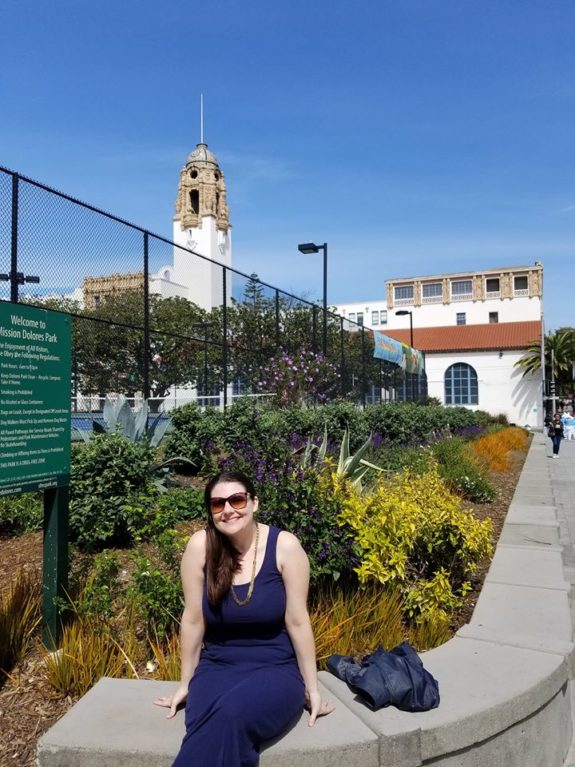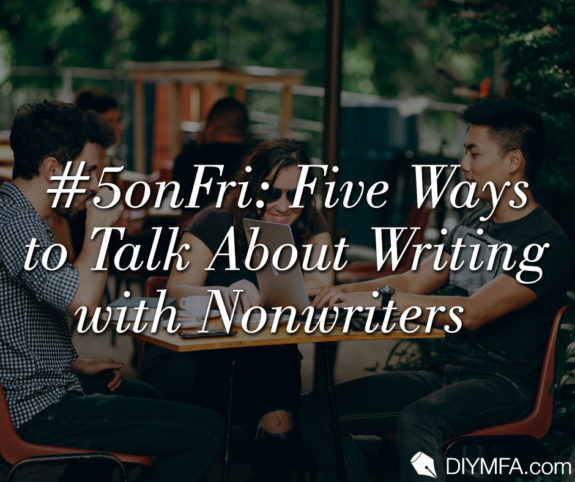Call them what you will. Nonwriters, Muggles, Philistines. Just kidding.
We know them. We love them. They’re our parents, our friends, our partners and significant others. They’re the people in our lives with whom we share everything.
But sometimes we aren’t always sure how to share this one thing with nonwriters. You know, one of our favorite things! The creative livelihood we enjoy that is completely wrapped up in our identity.
It’s tricky. We might assume a nonwriter isn’t interested. And if they say they are, they are just being kind. Or that since they don’t write themselves they won’t have much insight.
One of the best things about writing friends, critique partners, small coaching groups, professors, and colleagues is that we can talk shop with them. And if you have this in your life, I don’t have to tell you how rewarding it is to sit with a cup of coffee and have a nice chat about the joys and the perils of writing.
But there is a danger to sharing this part of ourselves only with people who “get it”. We don’t just write for other writers, we write for readers too, and their insight is important to our growth.
It’s so important for writers to have a growth-mindset that will allow for different opinions and get us outside of our echo chambers. Especially if we are writers who wish to share ourselves more and be less interior.
Here are five simple ways to get together with nonwriters and talk about writing.
Watch a movie or binge a show with them
It can be as easy as saying, “Wow the writing in this is really good/bad.” or “I can’t believe that’s what the character’s motivations were!” I mean you don’t have to be that obvious about it, but definitely feel free to share your opinion.
Recently, my husband and I watched the Queen’s Gambit and we both loved it. Which was cool because I could ask him why. I asked him what it was about the setting, characters, etc that he liked. Though my husband is typically a Sci Fi/Fantasy/Thriller guy he also really likes Historical Fiction, he just didn’t know what to call it and we had a great conversation about it.
Sometimes people have difficulty seeing what we see on the page until it’s put in front of them visually. But when we make connections with people in the moment talking about what makes something interesting or compelling that is likely to open up a dialogue more naturally.
Share your writing playlists with them
I have personal experience with how fun this can be. Somehow when nonwriters hear the songs that inspire your writing, it definitely opens up the door to discussing it. You can talk about your characters and settings and your plot in a way that feels natural and fun. Pour a glass of wine and just gush. People like hearing about things you are passionate about, especially if they care about you. They are also more likely to see the act of writing in a different way if they can connect it to something else that interests them.
Share a secret with them
This one is just for fun, but you’d be surprised how often it works to open up that dialogue. It could be anything from the research rabbit holes you go down: “Did you know that it takes 70 gallons of kerosene to burn down a house?” or something less incriminating, “Did you know it would only take four months to walk across the entire United States?”
You can also tell nonwriters what you found out about the publishing industry when you did your research or the little known fact about their favorite author that you know because you listen to their podcast. Keep this up and you are having lots of fun conversations about writing, and even showing your nonwriter friends that writing isn’t just about getting words on the page.
Tell them what you are working on
My husband is a tech guy. He’s a nonwriter. He has self-proclaimed on more than one occasion that he could never write a book, nor does he have the desire to. But when I share with him my blocks and difficulties he gives me ideas and insights I never would have come up with on my own. Sure he is clever at solving problems, and has a great sense of humor, but he also has something I don’t have: objectivity.
He tells me when things are working and when they aren’t working. And he does it in a way that doesn’t hurt my feelings, but motivates me to try harder. Frustrated writers might find themselves in workshop situations where other writers have narrow thinking and they don’t want to peak outside of their writer-box. A nonwriter (reader) can look at something objectively and say whether or not it is entertaining, or compelling or if it makes sense, and they make it about the writing and not the writer.
Ask them what they like to read
This might be the most obvious one. But if you know your nonwriter friend, parent, etc. is an avid reader, this is easy. Don’t just talk to them about genre, ask what makes them fall in love with a character, what gives them goosebumps, what makes them turn the page. Then talk to them about what you intend to do with your writing, or how you might succeed and fail in those areas. This will definitely peak their interest and if they aren’t already asking to read your pages they might start.

Amy Ayres is the Tech Fairy at DIYMFA. When she is not in her office writing about terraformed planets, multiple personalities, and Irish folklore, she is hanging with her awesome tech-hubby, stepson, and RubyCat. Visit amymarieayres.com where you can find out more about her private writer’s group Fill the Blank Page. You can sign up for her Newsletter where she sends out motivational tips for new writers and her special brand of humor. You can also find her on Twitter and Instagram.







